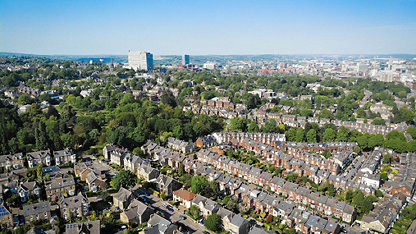In January and February, as the pandemic was starting to gain momentum and spreading around the globe, universities in the UK were beginning to consider how to react.
As a sector, UK higher education is relatively familiar with web-based methods of communication, teaching and learning. In fact, the University College of Estate Management (formerly The College of Estate Management) and the traditional home of RICS correspondence courses, operates their business totally online.
All universities operate a virtual learning environment (VLE) which allows them to communicate with their students and provides the opportunity to interact with them in terms of online classes and assessments, and as a depository for learning materials.
This is allowing the students to revisit the materials to embed or reinforce their learning or to catch up if a session was missed. Common VLE’s include Blackboard, WebCT, and Moodle. Their functionality and features are all relatively similar.
In advance of any lockdown measures, most UK universities took the decision to move their students off campus and deliver the remaining portion of their academic year studies online. As the academic year for traditional undergraduate students generally runs from September to May, and September to September for postgraduates, a significant proportion of teaching was already completed by mid-March when these decisions were made.
This was followed by the complete closure of campus facilities, although accommodation residences have remained open for those students living away from home with alterations made where possible to accommodate social distancing measures. All staff who could do so, including all academic and professional support, transferred to remote working from home. Although the physical libraries have closed, universities operate electronic libraries which offer access to a large number of electronic databases, and a growing number of books and journals, ensuring that the students and staff, can continue to access the majority of relevant information for their studies and research.
“In advance of any lockdown measures, most UK universities took the decision to move their students off campus and deliver the remaining portion of their academic year studies online ”
Teaching and learning have therefore continued online, and assessments have also been undertaken in this manner. Most universities have introduced further measures to ensure their students are not academically disadvantaged most commonly in the form of a ‘no detriment’ policy. Essentially these state that whatever academic results the students had obtained prior to the move off campus form the lower benchmark for their performance and any assessments still to be taken cannot lower that mark but clearly could improve it. Also, most institutions also gave the students the opportunity to defer assessments normally undertaken in May to the summer, thus giving them more time to prepare for those assessments.
The academic content of building surveying degrees varies between institutions and some retain practical elements, typically based around land surveying techniques, 3D scanning, or laboratory-based investigations for materials and structures. Depending on their timing within the academic year, the majority should have been completed prior to the lockdown although any practical elements remaining will have been replaced with simulated or theory-based exercises, ensuring that the required learning outcomes are still met by the student.
Although the number of students undertaking sandwich placements as part of their building surveying degree has reduced over the last 12 years since the start of the last recession in 2008, a number are still undertaken each year. These normally commence in the summer or autumn and following lockdown the students will now be in a variety of positions. Some have had their contracts terminated, others retained to work remotely, or furloughed with the intention of returning to the placement when it is safe to do so.
The placement is assessed by the university, alongside registration as part of the RICS APC process if the student wishes, with a series of learning outcomes to be achieved. Assuming the student did commence their placement prior to October 2019, then the likelihood is they will have achieved those minimum learning outcomes at the time of lockdown and so will graduate with a placement degree.
Universities UK (UUK) is the body that formally represents the views of 137 universities in the UK and they have been in contact with the government pursuing fiscal and other support for the higher education sector. In a letter to Michelle Donelan, the universities minister, they set out a series of measures that they believed were needed to ensure the future viability of the sector. A response from the education secretary Gavin Williamson on 4 May announced a number of initiatives that will hopefully ease the pressure on universities, and importantly their students, and these are currently being considered in more detail by UUK.
Following the announcement by the Department for Education that there would not be any large scale centrally organised unseen examinations, there has been consideration of the impact of this on the pipeline of new entrants and admission for the next intake of students in September.
UCAS is the body that controls and manages the application and admissions process into UK universities and all applicants joining as new undergraduate students must apply through them.
The examination boards who oversee this process will have full oversight and will be applying grade boundaries for the award of those differing grades in the normal manner. There is expected to be some additional turbulence in the post-results offer and acceptance process, as students may decide to defer their place until September 2021 so that they avoid any continued impact of COVID-19 on their studies.
As for commencement of teaching in September, it is very difficult to predict what measures will be required to be in place to ensure the health and safety of students and staff on university campus. The recently published government document Working safely during coronavirus (COVID-19) does not specifically mention universities although it covers labs and research facilities. Social distancing is expected to remain in place, and this will create significant issues for the scheduling and timetabling of lectures and seminars, severely reducing the capacity of classrooms and ancillary support facilities including the library, student union, student support and others. Elements of the curriculum may continue to be delivered on-line, creating a blended approach to learning, alongside the simulation of practical activities which could not be delivered with social distancing in place.
A final consideration is the now apparent difference in the easing of lockdown measures between the four nations of the UK and the legislation and guidelines of their devolved administrations. Currently students studying building surveying in universities in Scotland and Northern Ireland are living and operating under different rules to those studying in England and Wales, and it is unclear whether these will converge and become similar in the near future.
Building surveying education at universities will of course continue, ensuring that a new cohort of graduates are available from summer 2020, and that a pipeline of students and graduates is available going forward. What is less clear however, is how these students will be taught and what essential measures will need to be taken to ensure their health and safety.
- Dr Kevin Thomas, FRICS, is associate dean at Teesside University and a member of RICS Built Environment Journal’s building surveying editorial advisory group, k.thomas@tees.ac.uk








:16-9?$dpp-card-xxl$&qlt=85,1)




